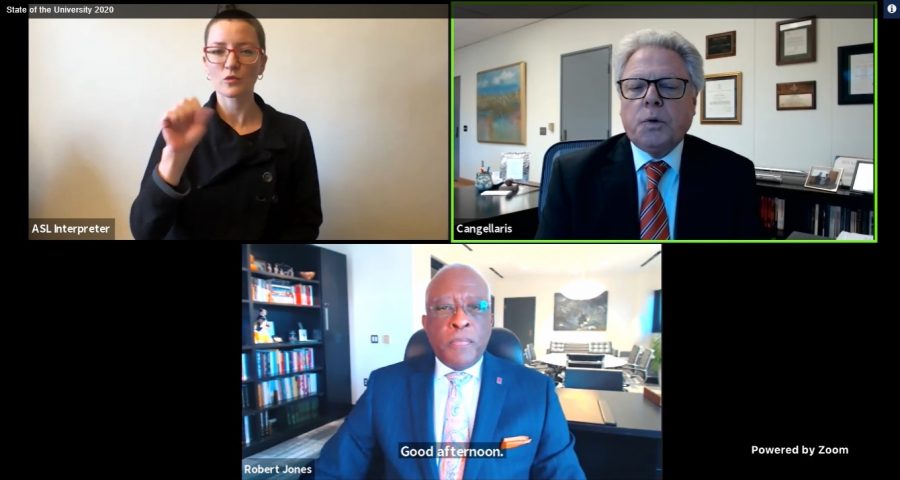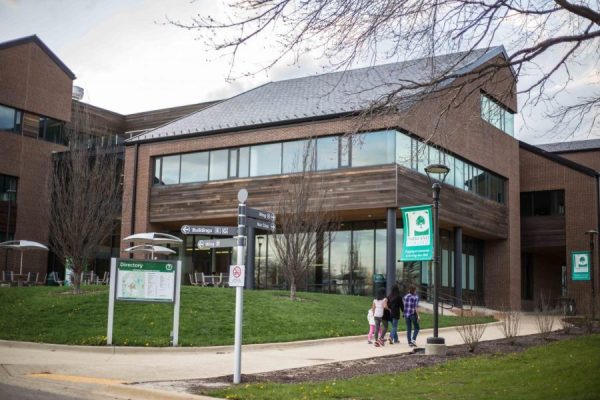State of the University: Jones announces mental health task force, potential academic policy changes
Nov 20, 2020
During Chancellor Robert J. Jones annual “State of the University” address on Thursday, Jones emphasized the unique challenges faced by the University over the past year and answered questions regarding the University’s budget, the academic calendar for the Spring semester and UI’s plan moving forward.
Notable announcements included the possibility of extending the drop deadline to Dec. 18, the formation of an administration, faculty and student task force to address mental health concerns and that in-person graduation will occur for both the class of 2021 and 2020 as soon as it’s “safe to do so.”
Jones spoke to the Illinois community from his office, as did Vice Chancellor for Academic Affairs and Provost Andreas Cangellaris and an American Sign Language interpreter, all through Zoom.
Jones began the address by emphasizing the power of resilience displayed by the Illinois community. He noted various University successes such as the impact of the Safer Illinois app and the University’s COVID-19 testing program in lowering the local test positivity rate, as well as the presence of the most diverse undergraduate class in University history.
Jones also addressed the challenges the COVID-19 pandemic has brought on the University, especially in regards to the mental health of the community. He announced that the University has created a group consisting of faculty, administrative staff and students to address mental health problems and devise solutions. The group plans to have their first meeting on Monday, Nov. 23.
Get The Daily Illini in your inbox!
“Mental health and self-care must be priorities for each of us individually,” Jones said. “They must also be institutional points of emphasis and investment throughout the duration of the pandemic. The pursuit of quality without an equal commitment to compassion will never be acceptable here at Illinois.”
Because of financial constraints placed on the University by the pandemic, Jones discussed the financial plan of the University going forward. He noted the estimated impact of the pandemic, from March until December, totaled $191 million — roughly $16 million of which went toward running the University’s COVID-19 testing service.
“I am very proud to say that the choices we have made during this pandemic have been guided by science, evidence and advice from state and local public health experts, not by the cost of taking those actions,” he said.
Jones stated that the University anticipates seeing a loss in revenue continuing in the Spring semester. To mitigate this, the University plans to develop a contingency plan to deploy in the case of reduced state funding. Jones also stated that the University is “making strategic reductions.” He did not specify what departments or programs these reductions will focus on.
The second half of the address was spent answering questions submitted by students, faculty and community members. Cangellaris rejoined the call to ask Jones the preselected questions chosen from over 100 submissions.
Among the questions asked was whether the University plans to institute a credit/no-credit option for grading. Cangellaris stated that the University has been listening to student concerns, and the academic senate is considering policy modifications to provide students with additional flexibility with academic options for both the fall and spring semesters.
The academic senate is considering extending the drop deadline to Dec. 18, and giving students the option to convert a failing grade to a form that does not factor into the GPA. The academic senate plans to meet Friday, Nov. 20, to discuss these options.
Looking ahead to the spring semester, Jones answered a question regarding the possibility of in-person classes for international students. Jones responded by stating that next semester will consist of a hybrid schedule similar to the previous semester, and international students will have full access to online classes.
Jones also answered questions about the possibility of an in-person graduation ceremony. Jones clarified that the University plans to hold an in-person graduation ceremony for the class of 2021, as well as the class of 2020 who had their graduation ceremony canceled this past May, as soon as it’s safely possible.
In addition to speaking about the effects the COVID-19 pandemic has had on the University, Jones also focused on the social justice mission of the University, as well as the importance of academic freedom.
“Academic freedom and freedoms of expression are bedrock principles of this University as a public research University and as a land grant institution,” Jones said. “We need to remind people that free and open exchange of ideas and information is absolutely necessary to advance our democracy. We have to remind ourselves that we’re free to dispute, free to debate, free to challenge ideas and perspectives, but the University must always stand against racism, religious intolerance and discrimination in any form.”
In the past year, the University has seen many incidents regarding alleged discrimination and intolerance. A week prior to the address, a University employee resigned after receiving backlash following the surfacing of racist and Islamophobic tweets. Earlier in the year, several Jewish organizations filed a federal Title VI complaint with the U.S. Department of Education against the University for inadequately addressing an alleged environment of anti-Semitism.
Jones concluded the address by stating he hopes the current Illinois community will remember this year and all the hardships it included.
“I hope previous generations understand that, notwithstanding all of the challenges that we know personally this pandemic has caused them to have to endure, this University has put their health and safety first and will continue to do so,” Jones said. “I hope they will be the storytellers for future generations about the good and the bad they’ve had to endure during this year of COVID-19, and how they were able to step up and contribute to this University’s ability to stay together and deliver the hybrid version of education we promised back in August.”






